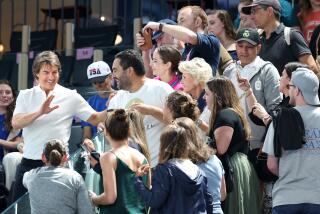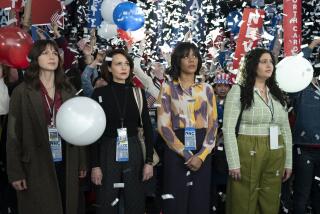TV GIRDS FOR THE GENEVA MINISERIES
- Share via
The Americans are coming, the Americans are coming.
Actually, they’re already in Geneva, hundreds and hundreds amid an estimated 3,000 to 4,000 international media covering the summit meeting between President Reagan and Soviet leader Mikhail S. Gorbachev. Switzerland hasn’t seen this many trench coats in years.
Send in the ringmaster.
TV is covering the summit like a body stocking, coverage that began with Reagan’s arrival in Geneva on Saturday afternoon, which CBS and CNN inexplicably telecast live and were to do the same for Gorbachev’s scheduled arrival at 2:45 a.m. today.
Those lucky CBS and CNN viewers saw America’s First Couple deplane at Geneva Airport and navigate a reception line across a red carpet en route to some microphones. The suspense grew as Swiss President Kurt Furgler made some perfunctory remarks, followed by some equally perfunctory remarks by Reagan. Then Ron and Nancy entered a limousine and rode off, waving to the crowd. It was breathtaking.
“All it is is men getting off airplanes,” said Jeff Gralnick, vice president and executive producer of special programming for ABC, which chose not to cover the arrivals live. “They have walked off airplanes before without trouble, and it is not news,” said Gralnick from Geneva. “We don’t want to go on the air gratuitously. The news is what happens behind those closed doors for two days.”
There are a few media people to tell us about that too.
Although Reagan and Gorbachev are to meet only Tuesday and Wednesday, all three networks are originating their evening newscasts from Geneva this week (CBS and Dan Rather began Friday, in fact).
The NBC News contingent in Geneva numbers 150 (including 18 camera crews), ABC 125 and CBS 100. CNN brought in 50 people, and “The McNeil/Lehrer NewsHour” on PBS has Jim Lehrer in Geneva.
Locally, KABC-TV Channel 7’s “Eyewitness News” (apparently not trusting ABC network coverage) sent Warren Olney to Geneva and also displayed a sharp sense of humor by flying in house comedians Bruce Hershensohn and John Tunney to soak up insights the way California sunbathers do sunshine. Oh boy.
You may have the impression that only NBC’s Willard Scott is missing from Geneva. Yet there are a few other network absentees too.
The morning shows, for example, are throwbacks to those days when only the men went off to do the heavy mental work while the women stayed home to do the sewing and cooking. So Bryant Gumbel is co-hosting NBC’s “Today” from Geneva, while Jane Pauley sits this one out in New York. ABC’s “Good Morning America” is based in Geneva this week, and so is David Hartman, while Joan Lunden naturally remains in New York. And while Maria Shriver continues to co-anchor “The CBS Morning News” in New York, her partner, Forrest Sawyer, will greet viewers from Geneva.
So much for TV’s equality of the sexes.
Meanwhile, the networks’ intensely competitive news divisions will be warring for viewers in Geneva even as Reagan and Gorbachev tough it out at the conference table. TV has enough facilities at the summit to “present non-stop blather,” said Lane Venardos, executive producer of “The CBS Evening News,” from Geneva. He vowed that wouldn’t happen on CBS.
Won’t the media, if only by sheer force of numbers and TV’s pervasiveness, become a major part of the Geneva story, though? NBC News President Lawrence Grossman doesn’t buy that at all.
“I’ve been hearing a lot of stuff about the story becoming all of us, but I think that tends to become overplayed,” Grossman said from New York. “The trick will be for us to make sure the issues are as clear as possible and that we don’t give undue weight to the dramatics only because they are easier to report.”
Would there even be a Reagan/Gorbachev summit if not for the presence of TV?
Well, long before TV, there were summit meetings involving world leaders. In reading Charles L. Mee Jr.’s “Meeting at Potsdam,” moreover, one is struck by how relatively benign and insignificant were the media in conjunction with the Cold War-shaping Big Three gathering of Harry Truman, Josef Stalin and Winston Churchill (and later Clement Attlee) in pre-TV 1945.
Mees writes about a typical briefing of reporters at Potsdam:
“The journalists were allowed 10 minutes--that was all--and then they were hustled out of the room and banished from the conference to go back to the Berlin bars, complain of secrecy, whip up rumors and read the dispatches that came in from other parts of the world.”
Compare that with the swelling public relations crescendo in Geneva, where both sides, especially the usually secretive Soviets, are hotly courting the media while trying to shape the coverage.
“As long as they (Reagan’s and Gorbachev’s people) control the agenda and the access, and as long as they provide the spokesmen, they are in the driver’s seat,” Venardos said. “But after we sift through all the leaks, we’ll probably find out if something gets done, or if nothing gets done.”
Reagan/Gorbachev summit coverage didn’t begin in Geneva, of course. The networks seemingly have been covering this story for months, and that includes a useful 11-part series probing U.S.-Soviet relations on ABC’s “World News Tonight.” Useful to some, that is.
The ABC reports were “a civics lesson for sixth-grade students,” according to Venardos of CBS. “I felt they were preaching and talking down to me. No one can absorb all that information. We’re trying to keep our coverage to a moderate level.”
“He sounds to me like a man who wished he had done it himself,” ABC’s Gralnick said. “I would never say anything like that about another news organization.”
The war escalates.
More to Read
The complete guide to home viewing
Get Screen Gab for everything about the TV shows and streaming movies everyone’s talking about.
You may occasionally receive promotional content from the Los Angeles Times.






